Drew Myron's Blog, page 16
August 18, 2021
The bad do not win
Dear You,
Everything now takes extra effort.
The hits keep coming: pandemic, heat wave, fires, drought, and so many people struggling to survive illness and death. A pressing fatigue makes it difficult to muster energy for the next chore, the next day, the next crisis.
I wish for languor, to unwind the mind and heart with thought and pause. Praise is what I first typed, on accident — or maybe purpose — because isn't pause a slow sort of praise?
We are sticking close to home. Each step I take is small and cautious. The pandemic, combined with a general increase in vitriol, has turned me inward even more. Maybe what I'm feeling is age and defeat. While I haven't given up, I do at times feel resigned, and, really, that is an awful sort of sadness.
I left my job at the nursing home. It's a good decision, but one I struggled for months to make. I loved the work and the residents but I have spent nearly my entire career as a self-employed self-starter and it was difficult to change a system that is, in essence, an institution. It’s a tough time to work in healthcare. Yes, I'm sad and heavy hearted. But it was an excellent part of life that stretched and filled me beyond expectation, and I'm grateful for the good long run.
All these challenges have offered a new view. All these years, was I hopeful or just naive? I see now that one person may make a difference, but that difference may be small, or short-lived, or too little among the bigger machine of life.
I do wonder if heavyheartedness – surely this is a technical term — is my default setting. I have periods of lifting and short moments of ease, but maybe this is the core of me. I know this street, these turns, I know the route to keep me moving. Even if I never get home, I'll keep driving. And is that such a bad thing — to know your limits, your self?
But enough about me.
What I really want to know is, how is your heart? Is it small and clenched, or full and hopeful? Please, tell me where your mind wanders, how your heart stretches. Like a plant reaching for sun, I want to know what light you find.
With love,
Drew

August 12, 2021
The Artist in Novels

I love this passage (and the entire novel):
“What I feel is the sense of futility that emerges when the past is laid side by side with the present, like two photographs taken many years apart, when it become clear that there is no more time. . .
I feel something beginning to shift in me, and I am not sure I want it to; it is a reevaluation, a tiny release of the grip I have held on anger and am struggling to maintain against the frail specters I saw tonight.”
— The Strays, a novel by Emily Bitto
For years I’ve gravitated to novels with art themes. You too? A few favorites come to mind, and I’m always on the hunt for more:
The Great Man by Kate Christensen
The Italian Teacher by Tom Rachman
Take Me Apart by Sara Sligar
The Hare by Melanie Finn
The Goldfinch by Donna Tart
I need more art fiction in my life. Tell me, what art-themed novels have you loved?
July 25, 2021
I Am Not Weeping

Dear You,*
I am not weeping alone wishing more from above.
I am making a list of compelling words: frowsy, fortitude, dogged, pluck, cheeky . . .
I am absorbing the latest addition to my ‘best horoscopes’ collection:
Ask yourself: "What more can I accept here?" A power surge comes from letting go of that energy drain known as resistance.
I am re-appreciating the crystalline quality of Bluets by Maggie Nelson:
Mostly I have felt myself becoming a servant of sadness. I am still looking for the beauty in that.
I am discarding old journals written by younger me. Life is very much write & repeat. Then, again and still, I worried about my writing, my body, my purpose and place. I was then, and often now, both fevered and frail.
I am struck by a passage in This Is Not For You: An Activist's Journey of Resistance and Resilience by Portland, Oregon black activist Richard Brown:
Every day someone would ask how I kept doing the work without burning out. And I'd tell them it was easy: I only did the things for as long as I wanted to. As long as I was feeling useful and hopeful, I'd keep going, but as soon as something started to feel like a battle I know I wasn't going to win? I'd stop, and I'd move on.
I am thinking that resistance and resilience is the theme of our time. Not the grit of gripping tight, but the daily dull of keeping on.
But sometimes standing still is also life.
— John Ashbery
Dear You and You and You,
I am not weeping, or wishing, or alone.
I am standing still, holding on.
* Read: Dear Mr You by Mary-Louise Parker.
* * *
If you like this blog, subscribe here to get it delivered directly to your email. And please share on your social network of choice, or forward to a friend.
The world turns on words, please read & write.
July 16, 2021
Three Small Starts

Thank you, readers, writers, friends.
I was stuck, and a few small nudges have moved me.
1.
Don’t start with the big idea, says Naomi Shihab Nye. Start with a phrase, a line, a quote. Questions are very helpful. Begin with a few you’re carrying right now.
2.
Let’s consider this visual gem from poet-artist Mark Thalman:
Painters paint over what they don't like on the canvas. Sometimes the paint builds up so much, it has to be sanded down for the next revision. An artist chipping away has a block of stone to work with. Give yourself a block of words, and chip away what you don't need.
3.
Every morning for 14 years, Dave Bonta writes a 140-character observation.
I love this practice because observing leads to gratitude. And gratitude leads to appreciation. And appreciation creates joy. I want more joy in my days — and more writing — and a simple observation is the bite-size approach I need right now (and write now).
Instead of a character count, I’m writing three lines a day. If I write more, good. If not, that’s okay, too. This is a no-pressure assignment.
This week:
Morning winds force the day into
a rush of hurry, worry, wait.
*
Walking past trees laden with fruit,
you pluck a small plum and shine
with summer’s sweetness and ease.
*
I was in love with distance, with what wasn't there,
like wanting to know the exact book that would open
to the telling page.
*
Through meadow, brook and bear grass fields.
Over talus and scrabble and scree. Oh, this beautiful burn
of legs stretching, lungs pumping, joy bubbling.
Is this happiness?
* * *
If you like this blog, please subscribe here to get it delivered directly to your email. And please share on your social network of choice or forward to a friend.
The world turns on words, please read & write.
July 11, 2021
Thudding Through
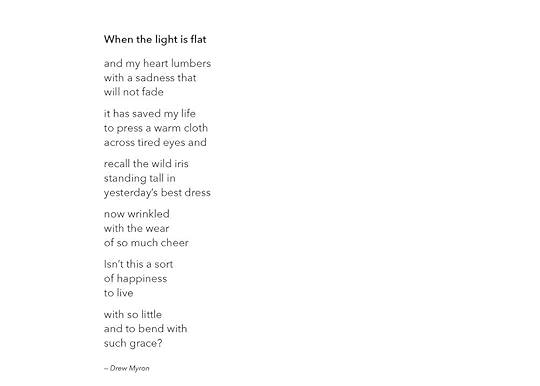
I’m stuck. Dried up, dulled down, depleted. Thudding through creativity’s long drought.
Do you know this state, and how do you get through?
A Note on What Not To Do: A few years ago, during an especially deep well of sadness, a “friend” offered (unsolicited) advice: Find your joy!
I gave a tight smile, snarled inside, and scratched her off my list. Because when you’re deep in the well, pushing a peppy platitude is just another punch to the gut. But I digress. Or do I? A deep sadness, after all, creeps into the mind in the same way a creative block bars the doors of expression. And because they share so many traits, perhaps the remedy is the same: Be gentle, be patient, move your body, and kick the inner critic to the curb.
I like this advice: keep trying.
Each time I write, each time the authentic words break through, I am changed. The older order that I was collapses and dies. I lose control. I do not know exactly what words will appear on the page. I follow language. I follow the sound of words, and I am surprised and transformed by what I record.
— Susan Griffin, from Thoughts on Writing: A Diary, an essay in The Writer on Her Work.
When I’m feeling down and stuck and creativity feels in a rut, I need encouragement and tricks. What gets you going, hand moving, words flowing?
Here’s a favorite writing prompt that I’ve been leaning on lately:
Lift A Line
Getting into the music and pace of a poem you like can help stir your own ideas and leaps of possibility. This exercise is borrowing a line, but also borrowing a rhythm and confidence that nudges you forward in a reminder of your own creative power.
1. Read a poem.
2. Borrow a passage or line as a launch to your own poem.
3. Write. Don’t think, just keep writing.
4. Give attribution to the line.
My poem above borrows the line — it has saved my life — from Mary Oliver’s poem, Loneliness, from Devotions: The Selected Poems of Mary Oliver.
Your turn: Pick a poem, lift a line, write on!
More Writing Prompts:
Try This: Word Catching
Try This: Where I’m From
Try This: Make A Scramble
Try This: You Know the Gnaw
•••
If you like this blog, please subscribe here to get it delivered directly to your email. And please share on your social network of choice or forward to a friend.
The world turns on words, please read & write.
July 1, 2021
Days Vanished

There’s not a lot of “good” to come from the pandemic but I can offer one bright spot: art.
Biennial of the Americas has curated the Covid-19 Memorial Virtual Exhibition and I’m happy to share that Days Vanished, an animated poem created with Tracy Weil, is among the Top 200 featured works.
It’s a beautiful show featuring artwork from all over the globe — and you can take part, too!
1.
Go here to view our video poem.
2.
Memorize this art tile image:

3.
View the exhibition here, find our tile, and vote for us.
You can vote once daily through July 18, 2021. The artist with the most votes receives a small cash prize and the happiness of creative affirmation.
_____
If you like this blog, subscribe here to get it delivered directly to your email. And please share on your social network of choice, or forward to a friend.
June 24, 2021
Thankful Thursday: Type & Ties
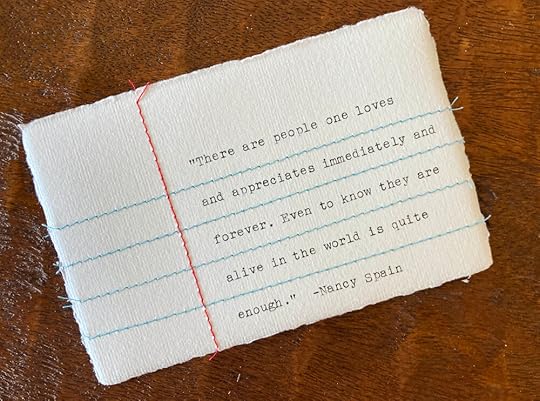
It’s Thankful Thursday, a weekly pause to express appreciation for people, places, things and more.
Like a confession, I’ll admit it’s been nearly a year since my last appreciation. My gratitude has been a bit spotty and consists mostly of pleading whispers to get me through this. But because attention attracts gratitude and gratitude expands joy, I keep trying.
On this Thankful Thursday, I am grateful for this card (above) from a friend, sent by old-fashioned mail, which is a gratitude itself.
Enclosed, this explanation:
The cards are made by Cartiera Amatruda from Almafi, Italy. They have been making papers since 1380 and still today use many traditional methods developed in the Middle Ages. Quotes are typed by hand on a 1939 Underwood Typewriter. Cards are then stitched on a Sears Roebuck sewing machine that doesn’t love paper as much as I do, but it cooperates! All stitched notes are made by hand by me in my studio in Denver and will have variations. — Julie
I appreciate this hand-stitched effort, but even more I’m thankful for the friend who knows me enough to know I would appreciate these words and this handmade-from-the-heart beauty. (I don’t know Julie but I can picture a word lover bent over a vintage workhorse).
On the heels of this gift, the day opened with this poem:
Safety Net
This morning I woke
thinking of all the people I love
and all the people they love
and how big the net
of lovers. It felt so clear,
all those invisible ties
interwoven like silken threads
strong enough to make a mesh
that for thousands of years
has been woven and rewoven
to catch us all.
Sometimes we go on
as if we forget
about it. Believing only
in the fall. But the net
is just as real. Every day,
with every small kindness,
with every generous act,
we strengthen it. Notice,
even now, how
as the whole world
seems to be falling, it
is there for us as we
walk the day’s tightrope,
how every tie matters.
— Rosemerry Wahtola Trommer*
Your turn: What are you thankful for today?
* Isn’t it time to name Rosemerry Wahtola Trommer the next Colorado Poet Laureate?
** Nancy Spain was an English reporter and writer.
June 16, 2021
Worth the Swim
How did I get so lucky? I’m on a roll of great books — one solid novel after another. This never happens. If you’ve ever experienced a long slog of tepid reading you understand my rapture.
But, really, it almost didn’t happen. Because age, time, and irritability have made me impatient, I nearly tossed these good books aside. They were moving too slow, too fast, too complicated, too cute. Or, more likely, I was restless and dissatisfied with something beyond the book.
My usual rule is to stop reading and move on; life is too short for less than stellar books, right?
Not so fast, Frances. I’m learning the best books — like people — sometimes take time to unfurl. Let this be a lesson to me, and maybe you, snap reactions are often misleading: the chatty neighbor may become your best friend and that cranky co-worker may be the sarcastic sidekick your life needs.
BOOKS
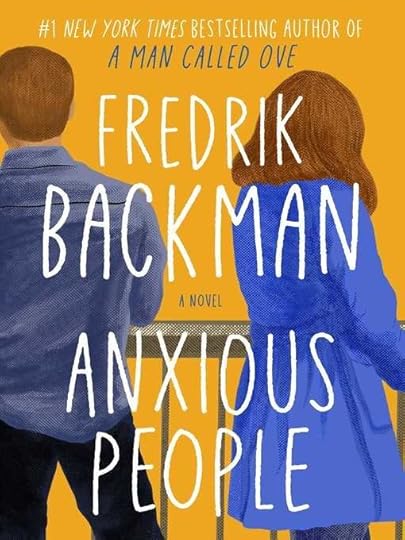
Anxious People by Fredrick Backman
I rarely hate a book but this one turned me grumbly. I threw it down, then remembered my friend loved this book and because I appreciate my friend’s (more refined) literary sense, I tried again — and loved it. It’s equal parts comedy, relationship drama, and locked-room mystery. On the first page, Backman writes, “This is a book about a lot of things, but mostly about idiots.”
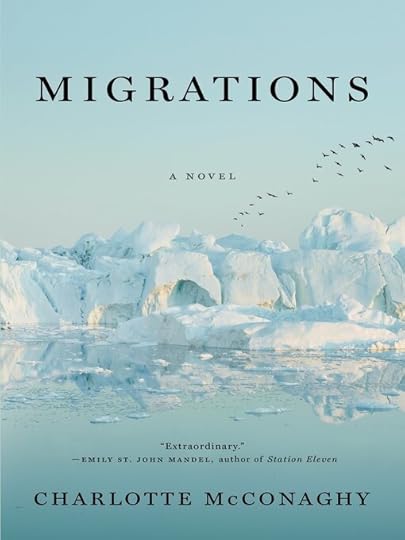
Migrations by Charlotte McConaghy
This was a very slow start with, what seemed to me, excruciating detailed descriptions of nature. Uggh. But that overly observant beginning turned into a brilliant novel of beautiful ache.
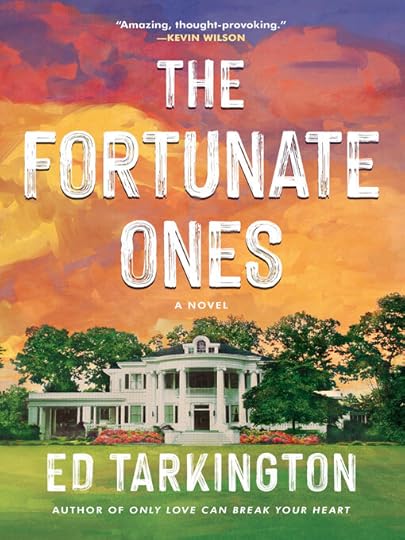
The Fortunate Ones by Ed Tarkington
Does the world need another coming-of-age novel? I hesitated to dive in, but this one is really worth the swim. It’s a page-turner with vivid characters and wry observations on wealth and its divide, with lines like this: “The sisters were striking, in the way people with breeding can be.”
MOVIES
Just as I tend to too-swiftly ditch a good book, I’ve been quick to pass on movies that linger in my Watchlist but never get watched. Don’t be me, view these gems now!
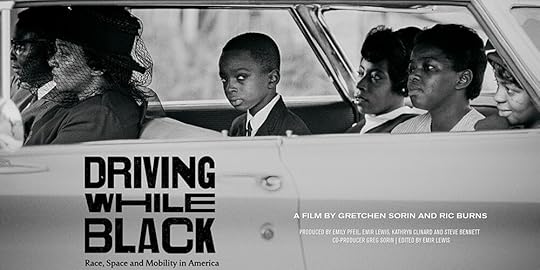
Driving While Black
A documentary exploring how the advent of the automobile brought new mobility and freedom for African Americans but also exposure to discrimination and deadly violence, and how that history resonates today. This is powerful & essential viewing. On Amazon and PBS.
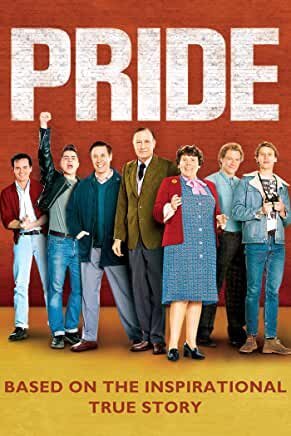
Pride
This sat in the Watchlist for six months before I watched it, and loved it, and wondered why I didn't watch it sooner. Based on a true story, this 2014 film is an inspirational and feel-good movie about an unusual but extraordinary slice of history involving the solidarity of two unlikely groups: gays and lesbians in London lending their support to striking coal miners during the Margaret Thatcher reign in 1984. On Amazon Prime.
The world turns on words, please read & write.
If you like this blog, subscribe here for free and easy delivery to your email. And please share this blog post on your social network of choice or forward to a friend. Thank you.
June 2, 2021
Be Dazzled
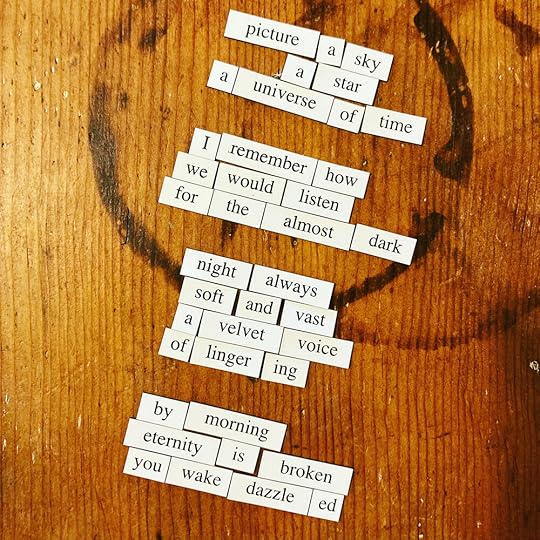
Dazzled, by Drew Myron
It’s June. Summer opens and I walk in, triumphant & dazzled.
It’s a wonder, isn’t it? That the world is wide, the heart opens and expands, the sun still shines? Forgive me the Walt Whitman moment; I feel a door of darkness has closed and beyond the threshold life is bright and alive.
It’s the summer season. Bare feet and watermelon heat. Bicycle rides and river swims, my limbs moving and lungs working. Poppies, petunias, tiny wild daisies. No thing unnoticed, or unthanked.
It’s a long dark year and now, suddenly, bright sun and hot days. Excuse the exalt; like weather, my mood won’t last — even now the wind is picking up, fires will start, the virus still boils — I know this, I do. But oh, what a relief, for just a day or two or god-grant-me-a-week, to know delight, to slip into ease.
Picture a sky, a star, a universe of time
I remember how
we would listen
for the almost dark
Night always
soft and vast
a velvet voice
of lingering
By morning
eternity is broken
You wake dazzled
— Drew Myron
The world turns on words, please read & write.
If you like this blog, subscribe here for free and easy delivery to your email. And please share this blog post on your social network of choice or forward to a friend. Thank you.
May 18, 2021
Good Books Find You
Lately, I'm interested not just in good books but the finding.
Libraries are closed, friends are far, and buying books can be an expensive habit. Often the best books are by chance, not the ones languishing on my long books-to-read list but the novel abandoned at the airport bar, the poetry tossed aside in the hospital lobby, or the memoir discovered down the block in the little free library with the squeaky hinges and odd assortment.
Like love, good books arrive when you've given up. Across a crowded world, a good book finds you.
Here are some of my recent keepers:

Juliet Takes a Breath by Gabbie Rivera
How found: Mailed to me by a friend with a note that said, I wish I could send you a library.
This is my favorite book of the year (so far). In fact, I liked it so much I had to force myself to stop racing through and instead slow down and savor. Smart writing, strong characters, and a fantastic "voice" of growing, yearning, and learning. Set in Portland, the Rose City is a character itself. Love this passage, referring to Powell's Books:
“It looked like the Salvation Army of bookstores, and who doesn’t
love a little dig through salvation?”

The Magical Language of Others by E.J. Koh
How found: From the Little Free Library down the street, during a week without internet service when I had run out of books, both digital and print. (Thank you, neighbor!).
This is a beautifully spare memoir written with a powerful level of poetic detachment that provides space to breathe and hold.
"What're we doing?
"We're arguing?"
"We're paying attention," Joe said.
Whenever he spoke, his words were sets of clothes that we tried on for ourselves. Sometimes they fit, and other times they were old and baggy."

Things I Do At Pennsylvania Rest Stops by Ashly Kim
How found: Ordered from Rinky Dink Press, a micro-press offering palm-sized books, after watching their zoom poetry readings that felt more like backyard barbecues than stiff online lectures.
ask strangers where i am and consider
how i got there in the first place.
auto-pilot down the weekend turnpike.
eighty-miles-per-hour-almost-ghost
with the navigation turned off.
— Ashly Kim
See Also:
The Golden Age of Diners by Tara Roeder
Roto: A Mex-Tape by Oscar Mancinas
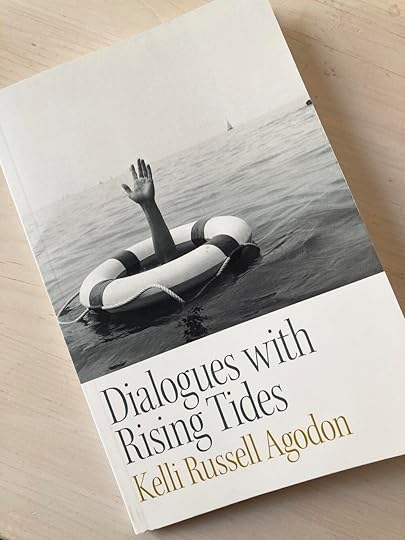
Dialogues with Rising Tides by Kelli Russell Agodon
How found: Purchased at my local bookstore, a place in which I had not lingered (because of pandemic) for over a year.
Agodon's fourth book is my new favorite. Always a strong writer, this poetry collection sounds the alarm, piercing daily life and gathering us together in the ache.
Magpies Recognize Themselves In The Mirror
The evening sounds like a murder
of magpies and we're replacing our cabinet knobs
because we can't change the world but we can
change our hardware. America breaks my heart
some days and some days it breaks itself in two.
I watched a women having a breakdown
in the mall today, and when the security guard
tried to help her, what I felt was all of us
peeking from her purse as she threw it
across the floor into Forever 21. And yes,
the walls felt like another way to hold us
and when she finally stopped crying
I heard her say to the fluorescent lighting
Some days the sky is too bright. And like that
we were her flock in our black coats
and white sweaters, some of us reaching
our wings to her and some of us flying away.
— Kelli Russell Agodon
Your Turn: What are your favorites lately? How do books find you?
If you like this blog, subscribe here to get it delivered directly to your email. If you like this blog post, please share on your social network of choice or forward to a friend.
The world turns on words, please read & write.



